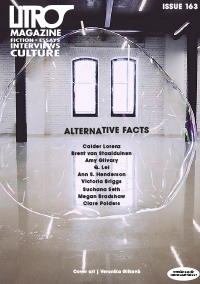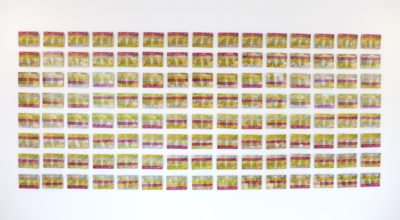You have no items in your cart. Want to get some nice things?
Go shopping We went to Tigre because we were told that it was a beautiful canal city floating on the delta of the Río de la Plata, named for the jaguars – known locally as tigres – which were hunted there until the end of the nineteenth century. S. didn’t dare to sit down when we caught the coastal train, because women in Buenos Aires become puckering, yawping dogs if one of their own is pregnant and an occupied seat is not immediately proffered. (It is a Catholic country, and like a slow bloodletting, elected democracy had just begun to suck out the chill of the last century’s dictatorship and recession: at least a quarter of Argentine women were pregnant.)
We went to Tigre because we were told that it was a beautiful canal city floating on the delta of the Río de la Plata, named for the jaguars – known locally as tigres – which were hunted there until the end of the nineteenth century. S. didn’t dare to sit down when we caught the coastal train, because women in Buenos Aires become puckering, yawping dogs if one of their own is pregnant and an occupied seat is not immediately proffered. (It is a Catholic country, and like a slow bloodletting, elected democracy had just begun to suck out the chill of the last century’s dictatorship and recession: at least a quarter of Argentine women were pregnant.)
Even before we went to Tigre, I discerned that S. wasn’t grown from hardy stock. He studied at a third-tier university in London and would become a dentist only a few years later, specialising in new techniques for root canals. The evening before our trip, he met three fellow dentists-to-be in the hostel bar, plying the pretty young women with cups of the local watery beer, which they all repeatedly exclaimed was outrageously cheap. As we passed each other in the hallway to the toilets, S. tugged the bottom hem of my sweater and held me with a searching look. “When I first saw you, I thought you were unattainable,” he said. S. then pivoted squarely into the nearest toilet and slid the door closed. I immediately heard water slapping water. That night, we slept as we had for the past week – the bunk beds making us siblings, my face levitated three feet directly above his, gently buoyed into slumber by mite-bitten planks and damp wools.
A man, neither middle-aged nor in his first youth, boarded the train at the station where the city’s outskirts meet the sea. He spent the entire journey squatting to one side, muttering at a long sliver of glass that he nestled in the crook of his arm. The glint of the bright morning reflected and flashed in his eyes.
In Partie de campagne, the women of a silly Parisian family find sexual happiness and precarious truce in the river skiffs and willow-shadowed coves of a country village on the Seine. I didn’t know if S. had seen Renoir’s film, but after we disembarked at the station in Tigre, he raced to a kiosk and returned to me with two tickets which included a round-trip cruise as well as coffee and tea. When our canal boat arrived at the main island’s first dock, the captain, a Bolivian whose once-broken nose had crimped into a hawk-like hook, roughly motioned us off. Before guiding his charge back into the olive-ashen light gliding above the sluggish tributary, he aimed his deformed centrepiece in the direction of an opening in the brush. There was, as they say, no soul in sight.
“The bloody Venice of bloody Latin fucking America,” S. snorted. He barrelled forward with the same blind assurance that would later guide him into countless apertures of astonishing dentition. I dutifully followed him like a pet. During the short voyage, we had passed baroque mansions shrouded in ceiba trees, their branches heavy with empty birdcages and brown wrinkled fruits. Large estate gardens stretched out onto private piers offering the newly disembarked Moroccan daybeds on which to instantly plop. But here, in the jungle and bog, there was no prettiness to invite the stranger in. Amid mosquitoes and a cold forest flushed with moisture, deeper still we plunged.
A small cottage emerged in the centre of a clearing. S. resolutely strode to the door and knocked. It was quickly opened by a petite abuela extending an open hand. When S. attempted to shake it, she slowly muttered “boletos,” giving me a queer sidelong glance, and I snatched our boat tickets from my pocket. S. said, with boyish sheepishness, “Is this the part when they open the Moët?” Bless the intricate webs of tension that the English weave themselves and then quiescently endure. We followed the old woman into a kitchen, where she dragged two chairs in front of a folding metal table. She handed me a mug, which I sipped to find was only hot milk. S. supped deep of a dark, black coffee. The woman stood rigidly against the wall as she waited for us to finish. All the while, she ran her tongue over a gold-capped canine. The several pesos that we left on the cold table were regarded with a matter-of-fact indifference. Leaving the cottage, we found that our path formed a loop, and it took us back to the dock through low-slung willows that flicked our cheeks. I thought I could hear howler monkeys in the distance. S. took me by the arm with a simple familiarity. “Let’s get back to civilisation,” he said, and I nodded. The sun was going down, although we had left the city when many were still taking their first coffee.
Abandoning S. to relieve a full bladder throbbing against my pelvis, I ducked back toward the underbrush. While spraying my steaming water onto a large waxy leaf, I began to appreciate how urination enumerates the daily clockwork of our lives. When I returned, S. was nowhere within sight. I hollered his name. I peered hesitantly over the dock, only to discover freshwater oysters nesting on the columns. S. had gone home without me. To be honest, I was not surprised, only troubled by the thought that another boat would not pass by for the rest of the night. Had I been deaf to S.’s calls when one had indeed appeared? Or did S. run away because professional honour prevented him from admitting that our trip had been a failure?
A small but robust barge, sailing from the north through the soggy purple mist, saluted my hail with the subdued note of a horn. It idled over like a slug slinking through mud. In the darkness, I could not see the captain steering the tiller at the stern, but as I entered the luminous cabin I saw only women, so many women, sitting on the floor against the wooden walls in two rows and wedged contentedly together like melting bonbons, their brown stomachs hanging greasy and fat. The woman next to me spoke lazily to her captivated companions in what I assumed was the Italian-Spanish that this delta has nurtured since its taming so many years ago. Every few seconds, she turned her head to blow a rollie’s smoke through one of the port windows. But as I listened more closely, I remembered that a friend from Colonia once told me that the Uruguayan football team shouts plays to each other in their native Guarani in order to confuse opponents. I imagined this woman’s smoke and scorched breath on my face and I imagined the promise of a glass knife in a man’s eyes, the celluloid glow of throaty kisses sheltered by a conspiracy of reeds, the old woman’s golden rotting tooth, S. in the hallway, tickets blowing in our faces, large striped cats with bullet holes between their eyes, the sound of piss falling on water, all if it running in the wrong order. Without thinking, I crouched down.
Reaching to loosen the leather sandals encasing my blackened swollen feet, the sight of my bloated stomach reminded me of the chicken that needed plucking, and the rug that needed thrashing, the pot that needed scouring. I wondered why I had used the hours to conceive of an aspiring English dentist named S., or mid-afternoon adultery on the Seine, when there was so much to do, and my time was running out. The smoking woman paused in the middle of a sentence and languidly handed me a sweet roll, which I thanked her for in our language. While I chewed, I looked out the window onto the sinewy clumps interleaving forest and swamp, the boat speeding past with haste, and I remembered that they were once ancient hunting grounds. But it was only after a flyaway from the woman’s cigarette ashes curled into my nose that my mouthful of flour and lard and sugar began to warm on the tongue with the centuries of untasted sweetness.

About M. Bradshaw
M. René Bradshaw is a Californian-born writer, translator, and culture critic based in London. She is the UK Editor-at-large at Asymptote, and a contributor for The London Magazine and The Times Literary Supplement.




